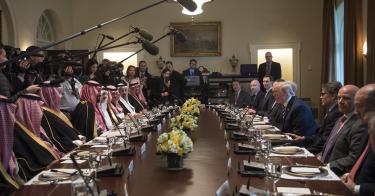Saudi Crown Prince Mohammed bin Salman is an ambitious young man in a hurry who is trying to reform his own country and secure the leading role of his wing of the ruling family.
He came to Washington this week seeking American help in modernizing the Saudi economy, defending its interests in Yemen, and cooperating to push back Iranian threats.
The 32-year-old prince, known in Washington by his initials, MBS, leapfrogged over more senior princes when his father, King Salman bin Abdulaziz Al Saud, designated him as the heir apparent in June 2017.
An Ambitious Reformer
The energetic crown prince has positioned himself as a reformer, unveiling “Vision 2030,” a blueprint for restructuring the Saudi economy by privatizing some of the kingdom’s oil assets, diversifying the economy to reduce dependence on oil revenues, and opening up Saudi Arabia to foreign investment and trade. Mohammed’s youth, his relatively moderate interpretation of Islam, and his push to ease restrictions on women’s rights have made him a highly controversial leader in the eyes of many Saudis.
Under his leadership, the Saudi government has cracked down on corruption, reduced the role of the nation’s religious police (which enforce Islamic values), and lifted restrictions on women driving, attending events in sports stadiums, and participating in the workforce.
Some Saudis have criticized the strict implementation of some of Mohammed’s new policies—particularly the highly publicized roundup of Saudis suspected of corruption—as rash and ill-advised.
But many of his reform efforts have appealed to young Saudis, particularly the 70 percent of the population that is under age 30.
Mohammed seeks to lead a revolution from the top down that would radically transform Saudi society and modernize its economy. He seeks help not only from the U.S. government, but also American business, technology, and educational institutions.
This is why he also will be visiting Boston, New York, Seattle, San Francisco, and Houston from March 24-30.
Warm Welcome at the White House
Mohammed’s first stop in Washington went fairly well. President Donald Trump received him warmly at the White House, where the two discussed trade issues, economic cooperation to advance Saudi Arabia’s reform agenda, security cooperation to contain regional threats posed by Iran, and the war in Yemen.
Trump had criticized the Saudi blockade of Yemen back in December and called for greater humanitarian aid for civilians caught in the fighting between the Saudi-led coalition (which intervened in support of Yemen’s government) and the Iran-backed Houthi rebels.
While the Trump administration has escalated U.S. counterterrorism efforts against al-Qaeda forces in Yemen, it has also called for a political settlement to resolve the Saudi-Houthi conflict which, thus far, has enabled Iran and al-Qaeda to gain influence inside Yemen.
On the same day the prince visited the White House, Congress also weighed in on the war in Yemen. It opted to kill a resolution that would have ended U.S. support for the Saudi military campaign due to the dire humanitarian situation there. This move signals the U.S. will continue to back Saudi forces in Yemen.
Though the administration was successful in lobbying against the resolution, the vote should serve as a reminder Mohammed—who is concentrating power in his own hands at home—that in Washington, political power is diffused and distributed between separate but equal branches of government.
While the crown prince’s close personal ties to Trump’s son-in-law, Jared Kushner, may give an immediate boost to Saudi Arabia’s agenda in Washington, in the long run the Saudis must develop good working relationships with the full spectrum of American institutions—and particularly with Congress.
This piece originally appeared in the Daily Signal



